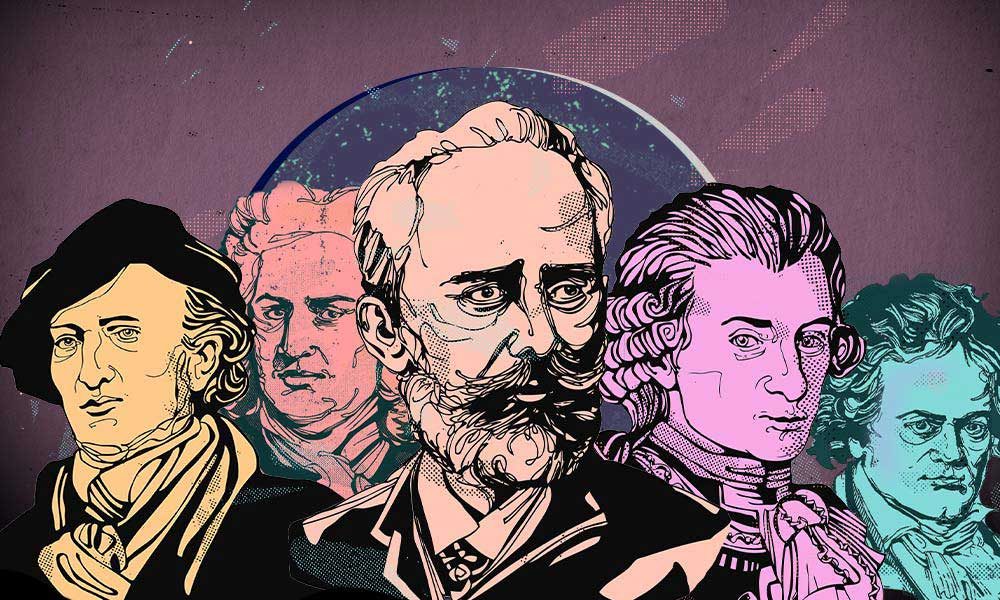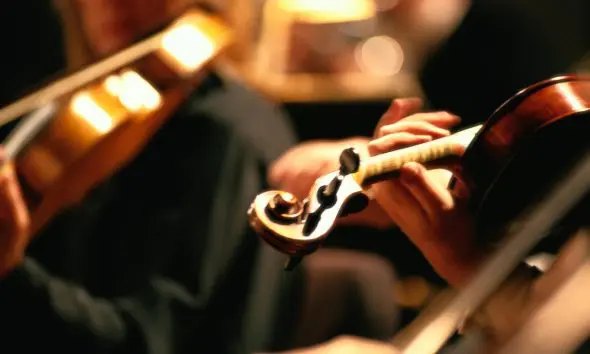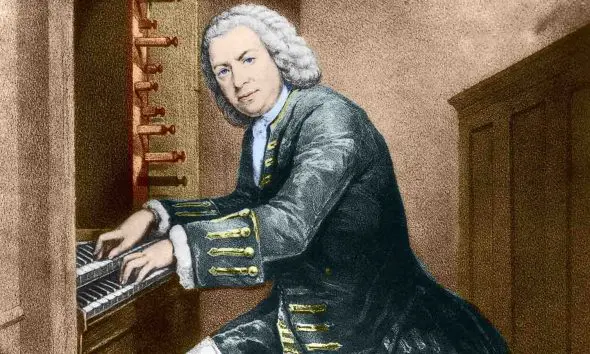Top 20 Best Classical Composers Of All Time
Who are the best classical composers of all time? Discover our selection of the top 20 greatest classical composers throughout history.

Who are the best classical composers of all time? The three composers that consistently appear in the top three places are Bach, Mozart and Beethoven – opinions vary on the rest. We’ve discussed and debated and compiled our list of the greatest and most influential classical composers. Scroll down to discover our selection of the top 20 best classical composers.
Johann Sebastian Bach (1685 – 1750)
Music poured out of Bach, all for the greater glory of God and, in Bach’s words, “the refreshment of the soul.” Organ music, church cantatas and incidental music for his employers were his daily bread. Bach, one of the greatest classical composers, wrote ceaselessly: it’s interesting that the hardest-working composer of all time should also be the one closest to musical perfection. For many, JS Bach’s endless lines, elaborate counterpoint and flowing harmonies somehow express the ideal state of all music – something beyond the shortness and contingency of human life. Playing Bach’s music on keyboard or solo instrument is also an amazing form of balancing therapy for the mind. Listen to Bach’s ‘Prelude In C Major’ from The Well-Tempered Clavier – a collection of preludes and fugues in all 24 major and minor keys which is generally regarded as being among the most important works in the history of classical music.
Wolfgang Amadeus Mozart (1756 – 1791)
Forget all that stuff about taking dictation from God. Mozart was always working, teaching himself to be a better composer and trying to be more than just a maker of music. He was a philosopher whose language was music, a pure product of the Enlightenment who believed the world could be healed through its power. He attempted to do all this in a way that strikes our ears as the purest ever conceived. That can tend to make us undervalue the intellectual and political weight of what Mozart, one of the best classical composers, had to say. Listen to the ‘Overture’ from one of Mozart’s greatest operas The Marriage Of Figaro.
Ludwig van Beethoven (1770 – 1827)
It’s not just the tunes, the blazing triumphs, the thundering highlights or the contemplative hymns and the rhapsodies. We all love Beethoven because even though it was all such a struggle against the world, his emotions and his deafness, he never lost his idealism or his faith. Beethoven, one of the greatest classical composers, is the composer as hero, alone against the universe, striving to understand, express, worship and improve it with his music. This titanic struggle comes across in almost everything he wrote, alongside a great lyrical tenderness and the overpowering sense of music being dragged into a new era. Listen to Beethoven’s Symphony No. 3 In E Flat, Op. 55 (Eroica) which was written in honour of Napoleon and is regularly voted the greatest symphony of all time.
Pyotr Ilyich Tchaikovsky (1840 – 1893)
The beau idéal of the Romantic composer, Tchaikovsky, put Russian music on the European map. A devotion to Mozart, Bellini and Donizetti reflects his own endless melodic gifts, which he yoked to a brilliant orchestral sense, plus his own very intense emotionality. This is music that wears its heart on its sleeve and concentrates obsessively on love, death and fate. Tchaikovsky, one of the greatest classical composers, is best known for his charming and ebullient ballets and piano concerto, but his symphonies possess much greater emotional depth. His operas, particularly Eugene Onegin, have a profoundly touching personal quality that makes them among the most loveable in the repertoire. Watch the enchanting video for ‘Dance of the Sugar Plum Fairy’ from one of Tchaikovsky’s most popular ballets The Nutcracker.
Richard Wagner (1813 – 1883)
You can love other composers more, but it’s hard to argue that Wagner, one of the greatest classical composers, didn’t have the most boundless musical imagination of all time. He stretched the language beyond all previous limits to create a wholly new expressive role for the orchestra, taking the forms and harmonic structures that had existed since Beethoven and before and subjecting them to extreme stress in order to convey uncanny depths of feeling and motivation. Wagner’s orchestra, forever commentating on the utterances and experiences of his operatic characters, taps into the subconscious in a striking way. This music can take possession of you like no other. The stories are fun, too. Listen to Georg Solti’s recording of Wagner’s epic Ring cycle which was described by BBC Music Magazine as “the finest recording ever made”.
Johannes Brahms (1833 – 1897)
Because he chose to work in forms and idioms that had apparently reached their zenith a generation earlier, Brahms has (wrongly) been thought academic and dull. You may even picture a stern and bearded patriarch, but the younger Brahms was a passionate Romantic Adonis, tormented with love for the wife of his mentor Robert Schumann. In the symphony and concerto Brahms found the ideal vehicle for combining his intellectual devotion to these forms, based on counterpoint and development, with a lyrical and spiritual dimension devoted to the idea of pure music in a way that was very unusual for the normal, wildly subjective Romantic composer. From the time of his great Symphony No. 1 Brahms’ place in music life was assured.
Franz Schubert (1797 – 1828)
Schubert was one of the greatest classical composers and there’s a serenity to much of his work which, if you didn’t know better, you might attribute to the idea that it all came easily to him. Yet his music has a special quality of interiority, expressed through an almost Italian devotion to melody combined with some rigorously German ideas of harmony and development. Much of Schubert’s orchestral work has a radiant air of contemplation and a delight in slow-moving beauty. But it is in his hundreds of songs and chamber works that he expresses himself most precisely, unerringly finding the source and expression of all human experience – from joy to hollowest grief. Listen to Schubert’s masterpiece setting of Ave Maria.
Robert Schumann (1810 – 1856)
Schumann is widely regarded as one of the greatest composers of the Romantic era. He is particularly renowned for his piano music, songs (lieder) and orchestral music. The originality of his work pushed at emotional, structural and philosophical boundaries. Schumann’s music is largely programmatic, meaning it tells a story (through music, not specifically through words). His musical influence extended decades into the future – his impact on Brahms, Liszt, Wagner, Elgar and Fauré, and beyond, is immeasurable. And he remains among the best-loved of all 19th-century composers. Listen to Schumann’s Carnaval – a selection of piano miniatures representing masked revellers at Carnival.
Giuseppe Verdi (1813 – 1901)
Italian opera of the mid-19th century seems almost too unsubtle a creature to have produced a great composer. Yet over the course of 50 years, Verdi turned its forthright poundings into a vehicle for conveying the most tearing emotions in an incredibly powerful way. Italian music had always relied on the power of melody, particularly conveyed through the voice. Verdi, one of the greatest classical composers, added a growing harmonic and orchestral sophistication. He combines deep compassion with a usually black view of human loneliness and hypocrisy to create intensely personal dramas of love and death, conveyed through a melodic genius of great sorrowful power. Listen to Verdi’s Messa da Requiem, one of the most famous and enthralling settings of the Requiem Mass.
George Frideric Handel (1685 – 1759)
He might have been Bach’s exact contemporary, but Handel and Bach could hardly be more different. Handel’s concerns are intensely human – real, aching hearts – and he is the master of massive effects made through the most apparently simple musical language. But don’t be misled by the grand ceremonial stuff and those vast choruses: they may be stirring and joyous, but the real man is to be found in the love songs and arias that deal with heartbreak and moral choice in his operas and oratorios. It is his exactness – finding the precise musical expression of intensely felt and isolated moments and feelings – that makes Handel, one of the greatest classical composers, different. And nobody could place a musical pause quite like him. Listen to Handel’s Messiah – an oratorio which traces the story of Jesus Christ and is one of the greatest choral works of all time.
Franz Joseph Haydn (1732 – 1809)
Haydn was one of the best composers of the classical period. Almost single-handedly Haydn established the formats on which classical music would be based for more than a century. Two titles are regularly bestowed upon him: “Father of the Symphony” and “Father of the String Quartet”. But his influence was equally important on the concerto, the piano sonata and the piano trio. Haydn’s most celebrated pupil was Ludwig van Beethoven, and his musical form casts a huge shadow over the music of subsequent composers including Schubert, Mendelssohn and Brahms. Listen to Haydn’s String Quartet In D Major, Op 76, one of Haydn’s most renowned string quartets.
Antonio Vivaldi (1678 – 1741)
Vivaldi’s influence on the development of Baroque music was immense. He ignited transformations in music for the church, the opera house and the concert hall. But his most important achievement was in his music for strings. He introduced a range of new styles and techniques to string playing and consolidated one of its most important genres, the concerto. Vivaldi’s concertos became a model for his contemporaries, and the form was soon one of the most important in eighteenth century Europe. Vivaldi’s The Four Seasons, a set of four violin concertos, are among the most popular pieces in the classical music repertoire.
Igor Stravinsky (1882 – 1971)
Stravinsky is widely considered one of the most important and influential composers of the 20th century. Although he composed masterpieces for almost every genre he is particularly well-known for the ballet music he composed for Diaghilev’s Ballet Russes including The Firebird, Petrushka, and The Rite Of Spring which famously caused a riot at its premiere in Paris. During the course of a long career Stravinsky composed an astonishingly wide variety of music. His work encompassed styles as diverse as Romanticism, Neoclassicism and Serialism. His style hallmarks include Russian folk inflections, rhythmic energy and orchestral virtuosity. Listen to The Rite Of Spring which caused a scandal at its premiere in 1913 but is now widely regarded as one of the most influential musical works of the 20th century.
Frédéric Chopin (1810 – 1849)
Chopin was one of the greatest composers of the Romanic era. As a pianist and composer his musical understanding and visionary imagination remains inimitable. Among the influences on his style of composition were Polish folk music, the classical tradition of JS Bach, Mozart, and Schubert, and the atmosphere of the Paris salons of which he was a frequent guest. His innovations in style, harmony, and musical form, and his association of music with nationalism, were influential throughout and after the late Romantic period. No other composer has contributed as many significant works to the piano’s repertoire. Listen to Chopin’s Nocturne In E Flat Major, his best-known Nocturne.
Felix Mendelssohn (1809 – 1847)
Mendelssohn was a German composer, pianist, musical conductor, and teacher and one of the most-celebrated figures of the early Romantic period. Robert Schumann, a close friend, perceptively described him as “the Mozart of the 19th century”. In his music Mendelssohn largely observed Classical models and practices while initiating key aspects of Romanticism. The Hebrides Overture and the Scottish and Italian Symphonies are quintessentially Romantic fusions of the musical and the visual. So too is the F sharp minor ‘Barcarolle’ from the second book of Songs Without Words op.30/6. Listen to The Hebrides overture inspired by the composer’s visit to the Hebrides islands off the west coast of Scotland.
Claude Debussy (1862 – 1918)
Debussy was one of the most influential composers of the late 19th and early 20th centuries and is regarded as the founder of musical impressionism. Reacting against the dominant influence of Germanic music with its logical rigours of form and development, he sought a new music of colour, sensation, fleeting mood and relaxed form that would be distinctively French, as well as distinctively his own. He developed a highly original system of harmony and musical structure and his music was perceived as sharing certain characteristics with the Impressionist painters. Listen to ‘Clair De Lune‘, perhaps Debussy’s best-loved piano piece, from Suite Bergamasque.
Franz Liszt (1811 – 1886)
Liszt was one of the most important composers of the Romantic period and is widely considered to be one of the greatest pianists of all time. He created the orchestral symphonic poem and devised the leitmotif technique that Wagner used in his epic operas. His piano compositions, such as the Études, the Hungarian Rhapsodies and the Mephisto Waltzes are brilliant showpieces, requiring both technical skill and expressivity. Many of his piano compositions are amongst the most technically challenging in the repertoire and he was known for popularising the music of other composers through his piano arrangements. Listen to Piano Sonata In B Minor which is generally acknowledged to be Liszt’s masterpiece.
Sergei Rachmaninov (1873 – 1943)
Rachmaninov was a legendary Romantic Russian composer, pianist and conductor. His music is characterised by sweeping melodies, virtuosic pianism and heady orchestration. Most of his pieces are in a late Romantic style akin to Tchaikovsky, although strong influences of Chopin and Liszt are apparent. Rachmaninov’s Piano Concerto No. 2 is one of the greatest works in the piano repertoire.
Antonín Dvořák (1841 – 1904)
Dvořák was one of the greatest classical composers and the first Czech composers to achieve worldwide recognition. He frequently incorporated folk elements from his Czech homeland into his music. After Brahms recommended his music for publication he turned full-time to composing in a wide range of forms but most successfully for the orchestra and for chamber music. Of his nine symphonies the most famous, From The New World, was written during his time as Director of the National Conservatory of Music in New York.
Gustav Mahler (1860 – 1911)
Mahler’s Romantic style was much influenced by Brahms, Wagner and Bruckner. Mahler’s symphonies were often conceived on an immense scale, with immense philosophical subjects: love and hate, joy in life and terror of death, the beauty of nature, innocence and bitter experience. He was also a great composer of songs, and in these smaller forms he distilled the essence of intense human emotions, developing and enriching his exquisite melodic gift in the process. Listen to Mahler’s Symphony No. 5 – the fourth movement, ‘Adagietto’, may be Mahler’s most famous composition and is the most frequently performed of his works.
Think we missed one of the best classical composers of all time? Let us know in the comments below.





KenL
August 6, 2019 at 1:20 pm
I cannot believe Richard Strauss is not on the list. Dvorak is great, although a Brahms copy in many ways.
MiserableOldFart
June 10, 2020 at 11:06 pm
I’d yank Vivaldi in favor of R. Strauss, but that’s just me.
David Beatty
September 25, 2020 at 4:45 am
Max Bruch. Listen to his first Violin Concerto!
RWC
August 6, 2019 at 4:58 pm
Typo in Debussy birth year should be 1862. Good list
Laszlo Jakabfi
August 19, 2019 at 12:18 pm
What about Bela Bartok and Leonard Bernstein?
mike
August 19, 2019 at 5:48 pm
Though Vivaldi is popular, he does not really deserve to be on this list in the stead of say Shostakovich. Vivaldi was simple figuarations, arpeggios and scalar units. He has the occasional moment of inspiration, but was not even half the composer of a plethora of others from Monteverdi to Schoenberg.
Love4classical
December 25, 2019 at 1:48 pm
Nothing is wrong with Vivaldi. He was a great violinist.
Reijo Salmenniemi
August 19, 2019 at 10:22 pm
Jean Sibelius is the greatest!
Kevin
April 5, 2020 at 8:33 pm
I think Sibelius is one of the greatest of the composers. Probably my favourite composer. His symphonies are so powerful and he has a great skill in making spine tingling melodies and powerful builds to endings. His symphonies, in particular No 5, No 2, No 1 and No 7 I believe are excellent. He of course has produced other works like Karelia Suite, Valse Triste, and orchestral works – Spring Song comes to mind. I have visited his house in Finland about 15 years ago and also his birthplace. Usually when Sibelius music is being performed I go to my local concert hall – Symphony Hall in Birmingham UK.
Diana
August 23, 2019 at 10:39 pm
Did you have to put Lang Lang’s Bach interpretation? 🙁
euhuang
August 23, 2019 at 10:41 pm
I would put Shostakovich, Ravel, Prokofiev to replace Vivaldi, Mendelssohn, and Liszt on the list
Daisy
January 6, 2020 at 1:31 am
So would I.
Jola
January 24, 2020 at 10:29 am
i’d love to extend this list of the greats instead of cutting off names.
Jeg623
September 6, 2019 at 4:18 am
Where are my queens!?!? I formally demand a list of the twenty best female composers!
Yole
December 20, 2019 at 12:11 am
It’s supposesed to be,”Where are my queens?!?!” not “Where are my queens!?!?”
Timaeus
July 23, 2020 at 9:23 am
Put Louise Ferrenc on it then.
Ulug Özkan
November 9, 2019 at 12:18 am
Where is A.Berg and A. Schönberg ? They are the best composers of contemporary classical music..Do you know any more musical piano piece than Op 1 A. Berg and more ineresting modern opera after Wozzeck ?
Ivan Balakersky
January 18, 2020 at 7:48 pm
You should have put Vladimir Gabay onto the list.
Løkkeliten
January 23, 2020 at 6:17 pm
Monteverdi! Messiaen! Tchaikovsky not! Verdi not!
Nadya Kogan
June 30, 2020 at 1:12 am
Tchaikovsky not!? The best!
Mi
January 25, 2020 at 6:28 pm
Question from a novice: Where do more modern composers (Barber, Copeland, Gershwin) come in on such a list?
Wilfredo
February 27, 2020 at 12:17 pm
Great music is german! (Where is Richard Strauss?)
Josef Lischeron
February 27, 2020 at 12:23 pm
Hier fehlt Richard Strauss. Unglaublich !!!!!!
Robert Moehle
February 28, 2020 at 10:42 pm
Where’s Charles Ives??!!
Classical/Opera Lover
March 12, 2020 at 3:27 pm
Good list, but Monteverdi, Rossini, Puccini, Bruckner, R. Strauss, Sibelius, Elgar, Bartok, Shostakovich & Prokofiev, belong there, too. In no particular order, the added composers give us a more diversified list of 30 great composers.
Don
March 23, 2020 at 4:09 am
LangLang belong to Chinese brutal communist dictators without any soul. DO NOT let that one to disgrace great composers.
Stephen
April 18, 2020 at 4:40 pm
A good list indeed but I’d certainly include Ralph Vaughn Williams and Henry Purcell. Both composers had unique, quintessentially English voices with universal appeal. There are few compositions that can best the Tallis Fantasy.
Yashb Gunasekar
May 9, 2020 at 12:34 pm
Where is Dmitri Shostakovich, Bela bartok, Maurice Ravel, Sergei Prokofiev, Benjamin Britten, Nikolai Rimsky Korsakov, Modest Mussorgsky , Gabriel Faure, Richard Strauss? So many amazing composers can be on this list.
AL
May 11, 2020 at 5:03 pm
The list is right on point. I understand individual preferences on certain pieces of music but overall the list is pretty fair based on the whole volume of lifetime work and impacts these composers produced.
RAUL J LIMESFUNDORA
May 17, 2020 at 12:41 pm
What about the Beatles ?
rockbanddad
June 18, 2020 at 8:33 am
yeah,yeah,yeah
roberthstiver
June 11, 2020 at 10:08 am
Fibich!
Kourosh
June 14, 2020 at 11:15 am
Shostakovich, Bruckner, Strauss are missing!
Asa Polanski
July 17, 2020 at 11:06 am
Monteverdi, Strauss or Schoenberg above Dvořák. Good list though.
Carlos Galiano
July 24, 2020 at 6:20 pm
You are crazy. Monteverdi, Domenico Scarlatti, Rameau, Corelli, Purcell, also Boccherini are more important than Brahms, Mahler or Stravinsky. And Rachmaninof is a lesser composer,less important than Mussorksky, Rimsky Korsakoff, Grieg, Sibelius, Smetana, Albeniz, Ravel, Rodrigo, Franck, Bizet, Bartok
E E
August 16, 2020 at 4:08 pm
Pretty darn good list as far as these things go…I might have dropped Vivaldi and Liszt for Puccini and Bartok. Rachmaninov, R. Strauss, Shostakovich, and Prokofiev are on the bubble. Schumann should be lower but makes the top 20.
Chris Konkol
July 25, 2020 at 3:39 pm
Really great list, more realistic than most lists. My own personal peeve is why Robert Schumann is listed so highly. For example, I would switch Mahler’s position farther down the list with Schumann. I sort of understand Schumann is considered the best romantic composer but in terms of masterpieces I don’t see how he can compare with Mahler or even Dvorak with his 9th Symphony.
Nick
November 28, 2020 at 12:40 am
10 female composers:
Clara Schumann
Francesca Caccini
Hildegard of Bingen
Fanny Mendelssohn
Cécile Chaminade
Germaine Tailleferre
Sofia Gubaidulina
Tatyana Chudova
Pinar Toprak
Lena Orsa
Lazarus Upson
February 11, 2021 at 12:21 am
Don’t forget Elizabeth Maconchy and Rebecca Clarke
Interlude.hk
January 29, 2021 at 5:03 am
Thank you for compiling an informative list of classical composers, this should be a good reference/guide to attract new listeners to classical music.
Lazarus Upson
February 11, 2021 at 12:27 am
Vivaldi deserves to be in every top 10 list of best composers just for the sheer joy and immense power he was able to communicate through his music.
I would take Mendelsohnn of the list though and replace him with Shostakovich.
Skookum
June 12, 2021 at 7:59 am
No Jean-Michel Jarre?
SE
July 16, 2021 at 2:21 am
Fantastic collection, I loved listening to these famous “potboilers”, if it’s okay to call them that with affection, one after the other. Good video accompaniment. I wish you could fill out the 3 or so you didn’t have a recording for. Merci beaucoup. My own favorite is the Chopin Nocturnes.This collection is a great revue.
Mark Zacek
August 30, 2021 at 9:19 pm
Vivaldi? His range is too narrow, although he was certainly creative within it.
Rachmaninov? Some very popular works, but not really all that many. His presence on the list and Sibelius’ absence is not justifiable.
Liszt? An important composer — definitely. A great composer? Nooooo way!
So swap in Sibelius, Ravel, and Puccini and then you’ve got yourself a great list!
Lee Riley Powell
February 6, 2023 at 9:23 pm
Bela Bartok should have been on the list. Bartok was a great modernist, an innovator in his studies of eastern European folk music, a composer who could provide eerie dissonances but in other passages still provide haunting melodies.
Robert Schumann made many great contributions to music as a critic and promoting the careers of Brahms and other worthy musicians. But he was a very good yet not great composer. I would place Bartok in place of Schumann.
Nishi
February 16, 2023 at 4:35 am
Don’t forget the great Freddy Fartface
Martyn Sinclair
March 18, 2023 at 10:07 pm
Elgar and Ravel
Patrick Kendrick
June 7, 2023 at 7:32 pm
Tchaikovsky-way overrated; music used in cereal commercials. Vivaldi-awesome!
Brian
February 14, 2024 at 1:57 am
There are no glaring omissions from the list, but I wouldn’t put Rachmaninov in the top 20. Bartok, Prokofiev, Shostakovich, and Richard Strauss would all be better choices than him.
Robert
April 9, 2024 at 11:31 pm
Robert April 9, 2024
I think you overlooked Georges Bizet, the great French composer.
Philip
May 8, 2024 at 6:41 pm
Christoph Willibald Gluck, Antonio Salieri, and Leopold Mozart, aren’t as popular but their music is still beautiful. I also like Luigi Boccherini.